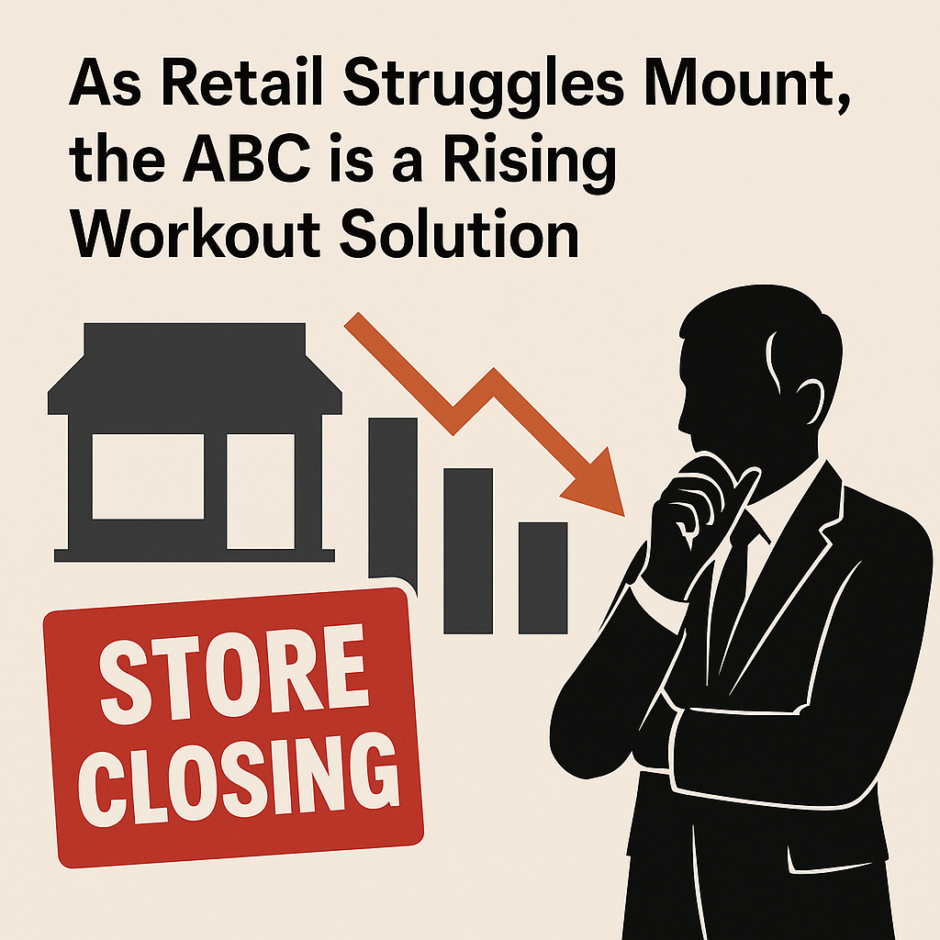As Retail Struggles Mount, the ABC is a Rising Workout Solution
The outlook is bleak for a number of retailers who once enjoyed a vibrant market of shoppers
across big-box stores, malls and other outlets.
The retail industry faces stagnant growth, according to Deloitte’s 2025 US Retail Industry
Outlook report, published in January, which notes squeezed margins and a shifting consumer
demand for “convenient omnichannel experiences,” among its challenges. With a compound
annual growth rate of 1.5% to 3.5% on average, retail is tasked with innovating to satisfy
customers who demand a new buying experience driven by efficiency — a shift Deloitte
identifies as “moving from ‘mass’ to ‘micro.’’’
As a result, many retailers are struggling. From the once-popular Joann fabric chain to clothing
retailer Forever 21, bankruptcy filings continue across the sector. In February, the restaurant-
and-merch chain Hooters reportedly was in talks around a potential bankruptcy. Joann, the 80-
year fabric retailer, filed for Chapter 11 bankruptcy in January with more than $615 million in
debt. Another former big-box store, Big Lots, made a similar announcement in September, and
Party City, which at one time counted 850 store locations, made its insolvency declaration a
year earlier.
The list continues, with the Container Store having restructured through Chapter 11 bankruptcy
in recent months, and Forever 21 commencing a second bankruptcy process in March.
“The filings continue for retail,” says DWC Chairman and CEO Douglas Wilson. “Yet it’s
important to remember that in many cases, bankruptcy is not the only option.”
The ABC: A Bankruptcy Alternative
As an alternative to Chapter 11 bankruptcy, an Assignment for the Benefit of Creditors (ABC)
can provide a series of advantages for some companies and entities facing insolvency.
“The ABC is a voluntary process during which a debtor agrees to have its assets liquidated
without the intervention of a court,” says DWC President Michele Vives, who recently spoke on
a California Receivers Forum panel about ABCs, alongside legal experts from Fennemore.
“Without the court involvement typical of a bankruptcy process, this structure can provide some
significant benefits to both debtors and creditors.”
Like a receivership, the ABC process is led by a third-party fiduciary–but rather than a court
appointment, the fiduciary, called an “Assignee,” is selected by the debtor. Often this selection is
made with creditor support.
Relative to a traditional bankruptcy proceeding, an ABC can:
● Minimize publicity. Because ABC proceedings are not filed publicly – as they are in the
court system – the structure can minimize headline risk for the debtor.
● Prioritize a fiduciary with specific expertise. Because the Assignee is chosen by the
debtor, this individual or company may bring specific experience to the assignment, such
as expertise in a given industry or asset type.
● Accelerate the workout process. In many cases, the lack of rigid court requirements
leads to a more timely completion of the assignment, which can expedite the return of
value to creditors.
“As distress continues in the retail sector and across other industries, debtors will be well served
to consider this option, if possible, as the structure for their workout process,” Vives says. “We
have seen success with the ABC process most recently in the workout for retail giant Zulily, for
which Douglas Wilson was selected as its Assignee.”
ABC Success Story: The Case of Zulily
Many will remember the initial success of Zulily — a Seattle-based e-commerce company that
at one time was valued at $4 billion.
After the company declared it was insolvent in December 2023, Douglas Wilson was selected
as Assignee in an ABC that would involve liquidating the company’s assets and returning all
value to creditors.
Zulily had significant assets including physical inventory, mechanical assets, intellectual
property and a pending antitrust lawsuit. Many of the physical assets and mechanical property
were located across two 750,000 square-food warehouses in Ohio and Nevada, and required
liquidation expertise.
Based on DWC’s extensive experience in operating companies, the assignment team swiftly
assessed the corporate structure, identified key leaders, located and reviewed the assets and
worked closely with all stakeholders to manage all creditor claims. Ultimately, the team
managed an orderly wind-down of the company, effectively utilizing the ABC structure.
“As we continue to see retail companies in distress — among other company types that are
subject to changing consumer demands and a shifting economy — we expect to see more and more opportunities to utilize the ABC process,” Wilson says. “Operating companies facing difficult realities should consider this an option toward resolution.”
Visit DWC’s website to learn more about Assignments for the Benefit of Creditors.
Celebrating 35 Years of DWC: The People Behind the Success
In 2024, DWC celebrated 35 years in business. As part of this milestone, we continue to
highlight our personnel and their contributions to 35 years of success.
Meet James Johnson, Office Administrator for DWC. James is a San Diego native who has
worked for the company for more than three years managing and coordinating administrative
projects and working with a variety of team members.
With more than 26 years of experience in the legal industry, James says his favorite project
since coming to DWC has been working on the company’s database. In his free time, James
enjoys baking. Fun fact: in his first job at age 17, James worked right down the street from
DWC’s headquarters in downtown San Diego.
When asked about his fondest memory from his time at DWC, James says: “The day DWC
hired me.”
If you, your colleagues or associates are seeking fiduciary services, or if you
have other specialized operating company or real estate needs, please contact us to
learn more about the DWC team and how we may assist.




